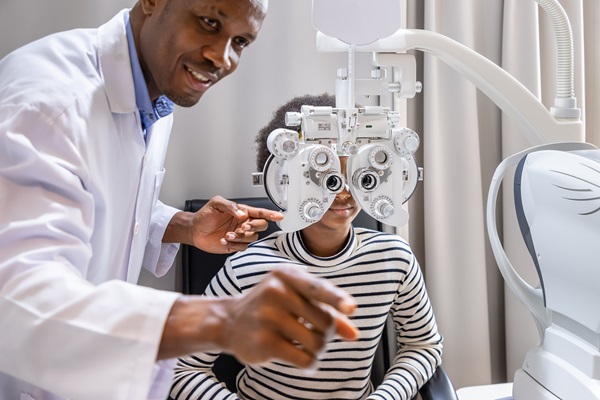Finding an Optometrist Near Me for Blurry Vision

Blurry vision can interfere with the life that you want to live. It can make you less able to engage with your surroundings and may even limit your ability to do daily tasks, such as driving. However, by searching the internet for "optometrist near me", you can find a professional to help resolve your blurry vision and bring the world back to clear quality, though it all depends on what is causing the blurriness in the first place. Here are a few ways that an optometrist can help fix blurry vision and how to find one whom you can trust.
How an optometrist helps with blurry vision
Optometrists are healthcare professionals who have received training to diagnose and in many cases, treat common eye issues like blurry vision. Finding one nearby helps maintain quality vision care over the long term; searching for an "optometrist near me" is a good place to start. An optometrist can do the following.
Conduct vision exams
The most common culprit for people with blurry vision is a lack of visual acuity. In other words, a person might struggle to see things far away (nearsightedness) because objects past a certain distance become blurred. The opposite can also be true: A person can see clearly when objects are far away, but when items are up close, they become blurry (farsightedness).
Such variations in visual acuity occur because of how the cornea, one of the working parts of the eye, reflects light. When the light focuses in front of the retina instead of directly on it, people struggle to see things far away. If the focal point falls behind the retina, a person will experience blurry vision when looking at nearby objects.
Optometrists can pinpoint how this focal process is working by conducting vision exams. They will discover which elements look blurry and which are in focus and how the light coming into the eye can be amended to restore clarity to vision.
An optometrist might recommend glasses or contact lenses to resolve blurry vision that results from acuity and focus problems. However, these are not the only potential causes of blurred sight.
Find eye problems
Sometimes, blurry vision can arise due to problems with the structure of the eye itself. For instance, in a person with astigmatism, the lens or cornea is curved in a way that does not match the other parts of the eye. This can cause light to reflect in unusual ways, resulting in blurred vision.
Similarly, an optometrist may notice strabismus, which is when one eye drifts to one side while the other remains focused and centered. Under this umbrella is amblyopia, more commonly known as lazy eye.
Treat eye diseases
Another area in which an optometrist can help with blurry vision is in the case of eye diseases. Optometrists regularly test patients’ eyes to ensure that they are healthy. They may tap the eye gently or expose it to a brief puff of air, which helps measure the pressure inside the eye. If the pressure is unusually high, the optic nerve in the back of the eye will gradually sustain damage, resulting in blurry vision and vision loss. This condition is called glaucoma.
Optometrists may also notice the presence of cataracts or retinopathy, which occurs when blood vessels in the eye degenerate due to blood sugar issues caused by diabetes. These are just a few of the many potential eye diseases that optometrists are trained to identify and where possible, treat.
Choose an optometrist
Finding an "optometrist near me" for blurry vision requires more than simply choosing the first office that shows up after a quick internet search. The person in charge of examining patients should have good bedside (or in this case, chairside) manner and make eye appointments easy to understand.
One of the first things to look for is proper licensing and training. Optometrists should be able to provide proof that they have completed their education and received their degree in optometry; the title for an optometrist is "OD," and it grants them the ability to offer eye exams.
It is also essential to look for optometrists who receive good reviews. Other patients can share if the professional is kind and caring and whether they regularly solve people’s problems.
Do not hesitate to ask a potential optometrist about the technology that they use in their office. Some locations use old equipment, while others stay on the cutting edge of advancements and best practices to protect patients’ eye health. An optometrist should be able to explain why they use the tools that they do.
Search for "optometrist near me" to find help
If blurry vision is interfering with how you want to live your life, you do not have to simply accept it. Talking to an optometrist is the first step in diagnosing the cause of blurry vision and getting appropriate treatment. Contact us to schedule an appointment with an optometrist nearby so you can return to seeing the world in clear detail.
Request an appointment here: https://www.texasoptical.net or call Texas Optical at (214) 771-7333 for an appointment in our Dallas office.
Check out what others are saying about our services on Yelp: Read our Yelp reviews.
Recent Posts
Dry eye treatment is important when occasional irritation becomes ongoing discomfort that interferes with daily activities. Many individuals experience dryness, burning, or a gritty feeling in the eyes from time to time. However, when symptoms start to affect reading, screen use, or time outdoors, a structured approach to diagnosis and care helps protect comfort and…
Myopia control focuses on slowing the progression of nearsightedness, primarily in children and teens, to help protect long-term eye health and day-to-day vision. Myopia occurs when the eye grows too long or the cornea curves too steeply, which causes distant objects to appear blurry. As the prescription increases, the risk of future eye disease also…
Retinal photography gives optometrists a detailed view of the back of the eye. When done regularly, they are often able to spot early signs of disease before symptoms affect daily vision. This advanced imaging tool helps create a clear record of eye health over time and supports smarter decisions about treatment and follow-up care. Learning…
Red, itchy eyes can affect your everyday comfort and reduce overall well-being. It is important to seek effective vision care from the first sign of irritation. Proper attention to symptoms, underlying causes, and healthy habits ensures stronger long-term eye health and greater day-to-day clarity. Redness and itchiness often stem from several common triggers. These include: Allergic…


